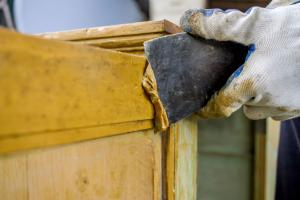The Ultimate Guide on How to Strip Paint: Techniques, Tips, and Tools

-
Quick Links:
- Introduction
- Why Strip Paint?
- Safety Precautions
- Essential Tools and Materials
- Methods for Stripping Paint
- Step-by-Step Guide
- Case Studies
- Expert Insights
- FAQs
- Conclusion
Introduction
Stripping paint can seem like a daunting task, but it's an essential skill for DIY enthusiasts and home improvement aficionados. Whether you're looking to restore furniture, prepare walls for a new coat, or simply want to refresh your living space, knowing how to strip paint effectively can save you time and money.
Why Strip Paint?
Paint stripping is crucial for several reasons:
- Restoration: Old furniture can be revitalized by stripping away layers of peeling paint.
- Preparation: Surfaces must be prepared before applying new paint for optimal adhesion.
- Health Concerns: Removing lead paint is critical for health and safety, especially in older homes.
Safety Precautions
Before embarking on your paint stripping project, it’s essential to prioritize safety:
- Always wear gloves and safety goggles.
- Ensure proper ventilation if using chemical strippers.
- Keep flammable materials away from heat sources when using heat guns.
- Follow the manufacturer’s instructions for all products used.
Essential Tools and Materials
Before you start, gather the following tools and materials:
- Paint scraper
- Wire brush
- Heat gun
- Chemical paint stripper
- Protective gear (gloves, goggles, mask)
- Sandpaper or sanding block
- Drop cloths to protect surrounding areas
Methods for Stripping Paint
Chemical Strippers
Chemical strippers are effective but should be used with caution. They work by breaking down the paint’s bond with the surface. Here’s how to use them:
- Apply the stripper generously using a brush.
- Let it sit for the recommended time.
- Use a scraper to remove the softened paint.
- Clean the surface with water or a recommended solvent.
Heat Guns
Heat guns can effectively soften paint for easier removal. Here's the process:
- Hold the heat gun a few inches from the surface.
- Move it back and forth until the paint bubbles.
- Use a scraper to peel away the softened paint.
Sanding
Sanding can be performed manually or with a power sander. This method is suitable for small areas or final touch-ups:
- Start with coarse sandpaper to remove the paint.
- Switch to finer sandpaper for a smooth finish.
Biodegradable Strippers
For those looking for an eco-friendly alternative, biodegradable strippers are available. They are less toxic and easy to use:
- Apply the stripper as per the instructions.
- Allow it to work on the paint.
- Scrape off the paint and clean the surface.
Step-by-Step Guide
Here’s a comprehensive step-by-step guide on how to strip paint:
- Assess the Surface: Determine the type of surface and paint you are dealing with.
- Select a Method: Choose a stripping method that suits your project.
- Prepare the Area: Clear the area and protect surrounding surfaces.
- Apply the Stripper: Follow the chosen method to apply the paint stripper.
- Remove the Paint: Use scrapers, brushes, or sanding as needed.
- Clean Up: Dispose of waste responsibly and clean the surface thoroughly.
Case Studies
Here are a few real-world examples of paint stripping projects:
- Case Study 1: A homeowner used a chemical stripper on an antique dresser, resulting in a beautifully restored piece.
- Case Study 2: A DIY enthusiast stripped paint from an old door using a heat gun, saving time and effort.
Expert Insights
Experts recommend always testing a small area first, regardless of the stripping method. This helps gauge the effectiveness and ensures the surface won't be damaged.
FAQs
1. What is the safest method to strip paint?
Biodegradable strippers are generally the safest option as they are less toxic.
2. Can I strip paint indoors?
Yes, but ensure proper ventilation and use non-toxic methods if possible.
3. How do I know if the paint contains lead?
Test kits are available at hardware stores to check for lead in paint.
4. How long does it take for chemical strippers to work?
It varies by product, but generally 15-30 minutes is common.
5. Can I use a heat gun on all surfaces?
No, avoid using heat guns on plastic or thin surfaces that may warp.
6. What should I do with the stripped paint?
Check local regulations for hazardous waste disposal for lead paint.
7. Is sanding effective for all paint types?
Sanding works best for water-based paints but may struggle with thick oil-based layers.
8. Are there eco-friendly options for paint stripping?
Yes, there are several biodegradable paint strippers available on the market.
9. How can I prevent paint from peeling in the future?
Proper surface preparation and using quality paint can reduce peeling.
10. Is professional help needed for large projects?
For extensive stripping, especially in older homes, consulting a professional may be wise.
Conclusion
Stripping paint doesn't have to be a tedious or dangerous task. By understanding the methods and safety precautions outlined in this guide, you can strip paint effectively and safely. Whether you're restoring a cherished piece or prepping a wall for a fresh coat, these techniques will empower you to tackle your project with confidence.
Random Reads